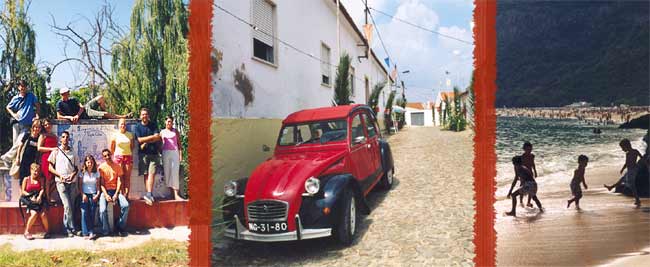 Ahh, vacationing in Portugal… the sun, the beaches, the ancient cities, the history. What could be nicer than tripping through the European countryside, relaxed and feeling that lovely expansiveness that comes from time spent in another culture? But what, one may ask, does such a location offer for the nature enthusiast? Portugal is, without a doubt, a country dominated by the marks of human habitation. The vineyards, olive groves and orchards so charming to the North American sensibility seem also to be quite lacking in the nature department.
Ahh, vacationing in Portugal… the sun, the beaches, the ancient cities, the history. What could be nicer than tripping through the European countryside, relaxed and feeling that lovely expansiveness that comes from time spent in another culture? But what, one may ask, does such a location offer for the nature enthusiast? Portugal is, without a doubt, a country dominated by the marks of human habitation. The vineyards, olive groves and orchards so charming to the North American sensibility seem also to be quite lacking in the nature department.
Without question, old European countries such as Portugal have lost a great deal of their natural biodiversity. By the early 1000s, Britain had already lost half of its forests. As can be expected, another thousand years of history has done a real number on Europe’s forested and other natural areas. Indeed, in Portugal, the native Pinhais (Pine forests) are scattered, fragmented, and difficult to find. A trip through the countryside will typically take you through agricultural land rather than forested valleys or lively grasslands.
But perspectives on the landscape are very different in European environmental discussion than North American. Whereas we tend to focus on nature as a sphere that excludes people, European environmentalism looks at preserving and restoring both the ‘natural’ and human characteristics of a landscape. People and natural processes are considered of near equal importance in shaping the land, and acknowledging the contribution of both is seen as vital in conservation efforts. Such an idea seems foreign to those of us used to looking at people’s activities as a solely negative factor in ecological health.
Interestingly, as more is learned about our own continent’s human history, it seems that our indigenous people actively altered their landscape as a part of their activities. Recognising that the North American landscape is not as ‘virgin’ as we have long liked to believe is an important part of recognising the full body of our indigenous history. But looking at the extent of landscape alteration in Europe compared to that the Europeans witnessed as they landed on the lush shores of the Americas, can any parallels really be drawn between human patterns of habitation in these two lands?
I had a moment when I thought doing so might just be possible. I was spending a day in the orchard with my husband’s family, picking apples, talking of the heaviness of the fruit on the limbs, the health of the soil, the best harvest techniques, and throwing around jokes about the townsfolk.
It reminded me so vividly of my time last summer with some Secwepmc friends in BC’s interior mountains. We had gone to a traditional soapberry collecting ground, talked of the quantity of the fruit on the bushes, the health of the soil and the plants, and the best way to harvest the berries as we laughed and joked about one another’s abilities and shortcomings.
The environment was so dramatically different, one so conspicuously controlled, the other much less obviously so. And yet in both cases, a profound sense of place and connection to the land was expressed, and an incredible base of knowledge was immediately apparent. Both groups of friends knew the land on which they had lived for generations upon generations, and it was clear that both felt a keen sense of belonging to that location. Both knew how to manipulate their local landscape to maximise the harvest — our Portuguese cousins irrigated and pruned; our Secwepmc friends burned and trimmed back.
Two very different landscapes, but two strikingly similar expressions of belonging. Such a world apart, and yet in both cases, provided for us visitors was a glimpse of what home can mean. In a time of chemical manipulation of our food-producing lands, of unsustainable rates of harvest of myriad resources, it is to this sense of home that we may wish to look for direction on how to take care of our natural world.
Zoe Dalton is a graduate of York University’s environmental science program, and is currently enjoying working toward a Master of Arts in Integrated Studies with Athabasca U. She can be reached for comments or questions at zk_dalton@hotmail.com.

